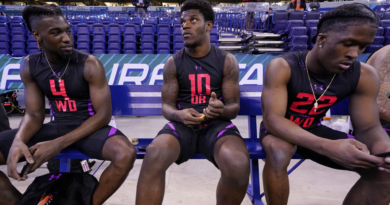RSN operator for 40+ teams files for bankruptcy
Diamond Sports Group, the Sinclair subsidiary that controls the regional sports networks for 42 teams across Major League Baseball, the National Hockey League and the National Basketball Association, announced that it has filed for Chapter 11 bankruptcy on Tuesday night, three days before the end of a 30-day grace period it entered into with creditors.
As part of a news release, Diamond, which has more than $8 billion in debt, said it “intends to use the proceedings to restructure and strengthen its balance sheet” and that the RSNs “will continue to operate in the ordinary course during the Chapter 11 process.” The company added that it possesses $425 million of cash in order to continue funding its business during the process.
MLB, whose teams draw significant revenues from its RSN deals with companies like Sinclair, is the most directly impacted by Diamond’s situation, given that its season will begin in less than three weeks. Diamond owns the rights to 14 major league teams and must continue to pay them their rights fees; otherwise, teams would be free to break their contracts, at which point MLB might take over broadcasting duties
To this point, Diamond has made payments to all its teams except the Arizona Diamondbacks, with whom they recently entered a contractual grace period. Other teams with Diamond, which run their broadcasts under the name Bally, include: the Detroit Tigers; Miami Marlins; Cleveland Guardians; Kansas City Royals; St. Louis Cardinals; Minnesota Twins; Cincinnati Reds; San Diego Padres; Los Angeles Angels; Atlanta Braves; Texas Rangers; Tampa Bay Rays; and Milwaukee Brewers.
MLB issued a statement on Tuesday night, calling the bankruptcy declaration an “unfortunate development” but assuring fans that they will not miss their team’s games this season.
“Despite Diamond’s economic situation, there is every expectation that they will continue televising all games they are committed to during the bankruptcy process,” the statement read. “Major League Baseball is ready to produce and distribute games to fans in their local markets in the event that Diamond or any other regional sports network is unable to do so as required by their agreement with our Clubs.”
The statement mentioned MLB’s experience with streaming live games on MLB.tv and producing games for MLB Network as proof of its capability “to deliver games to fan uninterrupted.”
“We think it will be both linear in the traditional cable bundle and digitally on our own platforms,” MLB commissioner Rob Manfred said of what it would look like if MLB takes on the responsibility of airing games in local markets at the onset of spring training. “But that remains to be seen.”
Sinclair, with Diamond acting as a subsidiary, purchased the RSNs from Fox in 2019, after Disney was forced to sell them off, for $10.6 billion. In the process, though, the company took on roughly $8 billion in debt, putting itself in a precarious position as the rate of cord-cutters increased.
Diamond, which initially began its grace period after skipping a $140 million interest-only payment to creditors in the middle of February, announced Tuesday it will now separate its business from Sinclair and become a standalone company. During bankruptcy proceedings, Diamond’s debt will turn into equity for its secured creditors.
The goal, a source familiar with the situation said, is for the company to acquire streaming rights for all 14 of its major league teams in order to broadcast games both through a linear cable model and on direct-to-consumer platforms. At the moment, Diamond has rights to stream the games to just five teams. It would have to negotiate the other nine with MLB, but MLB has previously been hesitant to sign off on additional rights for a company that has yet to prove itself financially sustainable.
Diamond’s filing was made through the U.S. Bankruptcy Court for the Southern District of Texas. In a statement, Diamond CEO David Preschlack wrote that the restructuring process “will allow [Diamond] to evolve our business while continuing to provide exceptional live sports productions for our fans.”
“With the support of our creditors,” Preschlack added, “we expect to execute a prompt and efficient reorganization and to emerge from the restructuring process as a stronger company.”
Diamond’s hope to building a sustainable business, a source said, is to prop up its Bally Sports+ streaming platform, ideally by making it a one-stop shop for fans to also purchase tickets and merchandise, place bets and read up on their teams. Diamond owns streaming rights for all 16 of its NBA teams and all 12 of its NHL teams, but for only about a third of its MLB teams.
Through the restructuring process, Diamond is widely expected to shed the contracts of its less-profitable teams. Not being able to acquire direct-to-consumer rights, which was part of the reason it entered into a grace period with the D-backs, will factor into which teams it chooses to hold onto.
MLB’s long-term goal, a source familiar with the league’s thinking said, is to control the rights for all its teams under one umbrella, a circumstance that could end the blackout issues that have plagued the sport in recent years. Diamond’s bankruptcy proceedings — in addition to Warner Bros. Discovery, which broadcasts the Pittsburgh Pirates, Houston Astros and Colorado Rockies, informing teams it will soon go through a liquidation — marks the beginning of that process.
In the short-term, MLB would broadcast the games of teams who end their contracts with Diamond both through their MLB.tv application and on a yet-to-be-determined cable channel. In anticipation of a development like this, MLB announced at the start of March that it had created a new local media department, headed by Billy Chambers, Sinclair’s former chief financial officer.
All team broadcasts, sources said, are expected to continue on as normal at the start of the season because Diamond is expected to keep broadcasting games while teams go through the court process of breaking free from their contracts after missed payments. The question becomes which teams Diamond will shed — the New York Post previously reported that the D-backs, Reds, Guardians and Padres will be among them — and how MLB approaches the situation thereafter.




